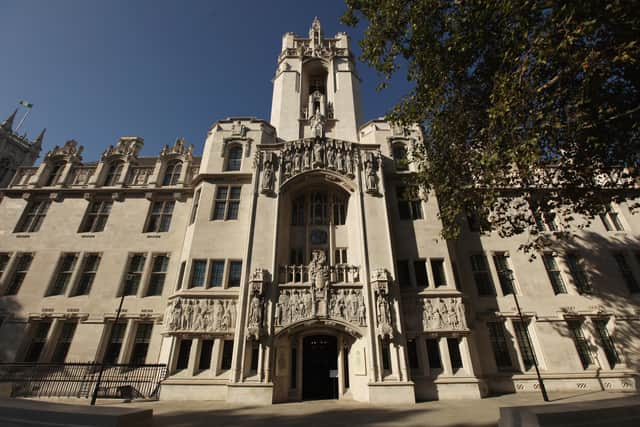Scottish independence referendum: what is Supreme Court case about? What Nicola Sturgeon and Liz Truss said
and live on Freeview channel 276
A Supreme Court case which will determine if a referendum on Scottish Independence can be held next year has began in London.
The Scottish and UK Governments will argue both sides of the debate at the Supreme Court, with a verdict expected after proceedings. The trial was launched after the SNP administration in Scotland sought to organise another referendum, however the UK Government blocked the party in doing so.
Advertisement
Hide AdAdvertisement
Hide AdThe verdict could have a huge impact on politics in Scotland, as well as the UK. Here’s everything we know about it.


Why is the Supreme Court case taking place?
In June 2022, the SNP announced that it was planning to hold a new referendum on Scottish Independence on 19 October 2023. However, there was one roadblock in its way - the UK Government.
For the 2014 referendum on independence, David Cameron’s government granted a section 30 order. This allows for the required devolved powers to be handed down temporarily in order to hold such a referendum in a country of the UK.
However, the UK Government has argued that the 2014 vote was a “once-in-a-generation” referendum, and another vote should not be held only nine years after the first referendum. Therefore, the UK Government, now under Boris Johnson’s control, refused to grant the section 30 order once again.
Advertisement
Hide AdAdvertisement
Hide AdThe SNP announced that they would continue to push for a section 30 order to hold the legal vote on 19 October 2023. However, party leader and First Minister Nicola Sturgeon also revealed that Scotland’s Lord Advocate Dorothy Bain would be preparing a legal defence in order to hold a valid vote, with the SNP believing that the UK Government was denying a democratic right to a vote for the Scottish people.
Essentially, the case will rule on whether the right to hold a referendum is a devolved or reserved matter. This means that if the Supreme Court rules in favour of the Scottish Government, the SNP will be able to hold the vote without being granted the section 30 order previously required.
What has Nicola Sturgeon and Liz Truss said about the case?
Sturgeon has been vocal since the announcement of the SNP’s plans to hold a legal vote on 19 October 2023. The First Minister has said that she and her party believed that Scotland should be able to hold the vote, telling supporters at the SNP annual conference in Aberdeen: “If Westminster had any respect at all for Scottish democracy, this court hearing wouldn’t be necessary. But Westminster has no such respect.”
But Sturgeon has also said that the government will respect “the rule of the law” if the Supreme Court rules against it. She said: “If the Court decides in the way we hope it does, on 19 October next year, there will be an independence referendum.
Advertisement
Hide AdAdvertisement
Hide Ad“And if the court doesn’t decide that way? First, and obviously, we will respect that judgement. We believe in the rule of law.”
Sturgeon added that, in the case the court rules against their argument, the SNP will campaign at the next election on the sole issue of independence and, if they win a majority, will go to the UK Government with a mandate to hold a vote.
Prime Minister Liz Truss previously said during her Tory leadership campaign that she believed Sturgeon to be an “attention-seeker” and would look to “ignore” her and her pursuit of independence. Additionally, Sturgeon has revealed that Truss has not yet spoken with the Scottish First Minister, despite being more than one month into her tenureship.
Truss has also said that even in the case the Supreme Court rules that a legally-binding vote can be held without the UK Government’s permission the referendum should not go ahead. She echoed her predecessor’s words, telling ITV News: “I’m very clear that, in 2014 when there was a referendum, we said it was once in a generation.
Advertisement
Hide AdAdvertisement
Hide Ad“I’m very clear there shouldn’t be another referendum before that generation is up.”
When is a Supreme Court decision expected?
The hearings will take place over 11 and 12 October, where both the Scottish and UK Governments will lay out their arguments for an against holding the vote. However, the judge will take a little longer to come to a decision.
There is no set date for when a decision is due. It may be announced the in the next few week or take as long as a month or two.
Comment Guidelines
National World encourages reader discussion on our stories. User feedback, insights and back-and-forth exchanges add a rich layer of context to reporting. Please review our Community Guidelines before commenting.
